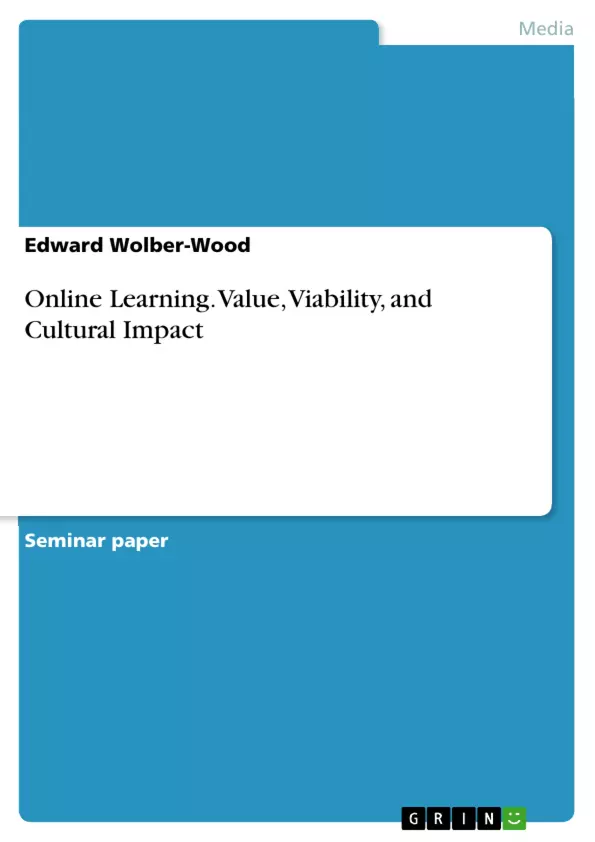Educated and informs readers about the value of receiving an accredited online degree from an institution of higher learning. The term paper dives into the data surrounding online education as it relates to a conventional on-campus education, the employment outlook, expected return on investment, and the perception of an online degree in society. By explaining the benefits and drawbacks with data rather than anecdotes or rhetoric, the paper offers readers a firm base of knowledge, upon which they can pragmatically analyze the situation and reach a conclusion regarding the usefulness and value of online education.
Inhaltsverzeichnis (Table of Contents)
- Distance Learning: A Look Back
- Online Education's Relevance in 2018: Culturally and Economically
- The Value of an Online Education
- The Viability of Online Learning
- The Cultural Impact of Online Learning
Zielsetzung und Themenschwerpunkte (Objectives and Key Themes)
This paper aims to evaluate the value, viability, and cultural impact of online learning. It compares online education to traditional, in-class education, analyzing the benefits and challenges of both approaches.
- The historical development of distance learning
- The growing cultural acceptance and economic relevance of online education
- The value of online education compared to traditional in-class education
- The viability of online learning in the 21st century
- The cultural impact and perception of online learning
Zusammenfassung der Kapitel (Chapter Summaries)
- Distance Learning: A Look Back: This chapter explores the origins of distance learning, tracing its history from early correspondence courses through the postal system to the modern era of online education. It highlights the benefits of distance learning, such as increased access and personalized learning.
- Online Education's Relevance in 2018: Culturally and Economically: This chapter examines the cultural and economic significance of online education in the contemporary world. It discusses the growing trust in internet information and the skepticism towards traditional education. It also explores the impact of online education on workforce demands and hiring practices.
Schlüsselwörter (Keywords)
This paper focuses on the following key concepts: online learning, distance education, higher education, cultural impact, economic relevance, value, viability, traditional education, in-class education, accessibility, affordability, student engagement, workforce demand, and cultural perception.
Frequently Asked Questions
Is an online degree as valuable as a traditional on-campus degree?
Data suggests that accredited online degrees are increasingly accepted by employers, offering a comparable return on investment and high viability in the 21st-century workforce.
What are the main benefits of online learning?
Key advantages include increased accessibility, affordability, flexibility for working professionals, and the ability to personalize the learning pace.
How has distance learning evolved historically?
It started with correspondence courses via the postal system and has evolved into sophisticated digital platforms that allow real-time interaction and global reach.
Does society still have a negative perception of online education?
While skepticism existed, there is a growing cultural trust in internet-based information and a shift in perception as more reputable institutions offer high-quality online programs.
What should students consider before choosing an online program?
Students should analyze the accreditation of the institution, the expected employment outlook in their field, and the specific return on investment based on data rather than rhetoric.
- Quote paper
- Edward Wolber-Wood (Author), 2018, Online Learning. Value, Viability, and Cultural Impact, Munich, GRIN Verlag, https://www.hausarbeiten.de/document/424294


